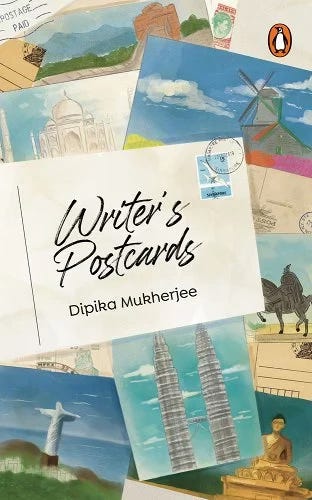Dipika Mukherjee is an accomplished and internationally acclaimed writer and sociolinguist. Her debut novel, Ode to Broken Things, was longlisted for the Man Asian Literary Prize, and her second novel, Shambala Junction, won the UK Virginia Prize for Fiction. She also has published a short story collection, an academic book, three poetry collections—including most recently, Dialect of Distant Harbors—and has edited several anthologies. Her latest book, Writer’s Postcards, is a delightful read.
Writer’s Postcards is an essay collection that's part travelogue, part memoir, part commentary. I love how this collection chronicling world travel blurs boundaries and resists easy categorization. There’s an unmistakable warmth to Dipika’s writing and is so beautiful I tore through this book quickly—and I’m now rereading it to more deeply consider this stunning collection about home, identity, belonging, imagination, and culture.
I’m so happy Dipika agreed to this interview!
You’re an accomplished, award-winning author who has written and edited several books. Did you ever doubt Writer’s Postcards would be published?
I think every new work comes with its own baggage of terror; I have published some books already, but this is my first book of essays, and non-fiction has a way of stripping off all the writerly veils we put on for fiction, or even poetry, and it is very scary to write in your own voice, literally screaming THIS IS ME, instead of hiding behind a fictional character who is warped in the many ways we all are, as human beings. So many of these essays were deeply personal, critical of my own family and community, and the countries I write about, that I was also concerned about hurting people whom I love or being cancelled by a larger community in some way. I write about journeying to different countries and finding a common humanity, but life is never all rosy, so there is criticism in that commonality as well as love. I didn’t worry about this book being published as Writer’s Postcards started as a column for a newspaper in Malaysia and Singapore, where I already have a large and welcoming literary network, but when Penguin Singapore acquired the book, I wanted to make sure it would also resonate with writers outside Southeast Asia. Trying to please everyone means that you end up pleasing no one (a lesson I learnt very quickly as a rebellious young girl in an Indian family!) and I am heartened by the reception this book is getting from readers around the world.
I really enjoyed the essay “The Advantage of the (Global) Asian Writer,” which offers advice and encouragement specifically to Asian writers, though I found what you said about submitting work applicable to all. Everyone should go and read it, but I was hoping you could share your thoughts on how to believe in one’s work enough to risk rejection.
I really LOVE that you enjoyed that essay, as I was afraid that this wouldn’t appeal to all writers. I teach at StoryStudio Chicago and at The Graham School at the University of Chicago and I meet a lot of new writers worrying about rejection. I think the only way to get over the fear of rejection is to set yourself a target of, say, 100 rejections a year, so that you are actively sending out work all the time, and looking at rejections “positively” as the means to a goal, which it almost always is. Not sending out work means that your writing will never be read by the public, so I urge students to form a critique group of writers who regularly read each other’s writing, and act as cheerleaders too. Sometimes a rejection comes with a wonderful note which is also a validation. Ultimately, in order to become a writer, one has to develop a thick skin, and I find that it is the students who are the most persistent who succeed. So keep sending the work out, and always keep something in the pipeline so that the possibility of an acceptance is on the horizon and within reach… don’t give up on yourself!
Can you share some reading recommendations?
In terms of travel stories, I love recommending The Crane Wife, which is an essay available in the Paris Review Essay, by CJ Hauser. I think travel writing should be less helicoptered and more personal, and she nails it.
I find myself reading women almost exclusively nowadays—they are so good!—and I really enjoyed Yellowface, which is a novel by R. F. Kuang and talks about how brutal publishing is for everyone, as well as All This Could Be Different, a novel by Sarah Thankam Mathews, which brilliantly deviates from the model-minority-assimilation stories from the Indian diaspora in the US.
Is there a song that ties into this book in some way?
This may be a bit cliché, but with the world in the state it is in, I can only hope for global co-operation and the song for that is Imagine by John Lennon.
Imagine there's no countries/ It isn't hard to do/ Nothing to kill or die for/ And no religion, too.
Thank you, Dipika!






Just ordered Writer’s Postcards—thank you for introducing me to Dipika Mukherjee!
You’ll be having an event in Chicsgo soon, right?